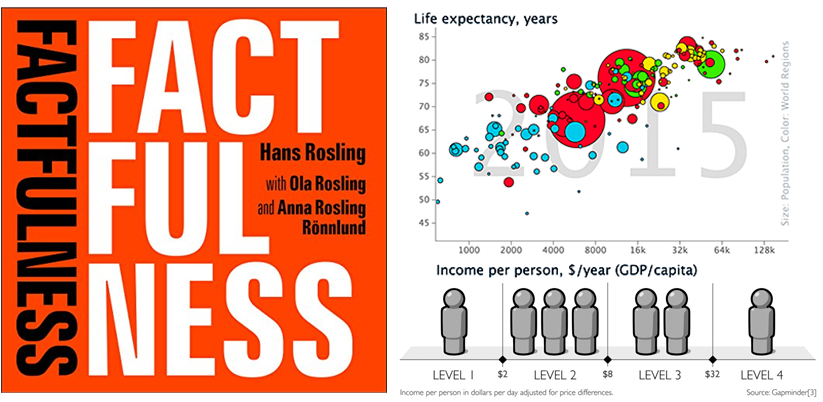Book review: ‘Factfulness’ inspires new hope
Opinions without strong supporting facts are misleading
Poverty rates and annual deaths from natural disasters have decreased, creating a higher quality of life for all people.
September 9, 2021
Does anyone else get instantly depressed when they hear negative news? Do you feel as though the world is not getting any better? As students in particular, do you ever feel like there is no hope for the future on this planet?
“Factfulness: Ten Reasons We’re Wrong About the World” by Hans Rosling helped me counter these tendencies and view things through a more fact-based and realistic lens.
I heard about the book while watching a Bill Gates interview on YouTube. Rosling, professor of international health and a man who can make data sing, collaborated with Anna Rosling Rönnlund and Ola Rosling. Working together, the three outlined 10 instinctual biases that cause people to misinterpret the world around them.
“This book is a very last battle in my lifelong mission to fight devastating global ignorance,” wrote Hans Rosling, who passed away in 2017. “It is my last attempt to make an impact on the world: to change people’s ways of thinking, calm their irrational fears and redirect their energies into constructive activities.”
When I originally finished reading “Factfulness,” I was confused by the optimism and statistics included in the book, which contrasts themselves with the distressing headlines of the failure of our world leaders to fight the net carbon dioxide emission count.
I felt unsure about the reality presented by the book’s graphs about falling hunger and death rates worldwide, placed next to the news story about two orphaned sisters who were refused food by scared neighbors because they feared contracting COVID-19.
It seemed reality could not possibly echo what the authors show us in the book. But what could really be believed?
My questioning of his decades of research actually proved him right. I concluded that we are molded by the news to believe that negativity is the only reality that exists. I do not know what I would be trying to prove by saying that again.
By proving that point, Hans Rosling provides hope for his readers. But it is not just aimless hope he provides, it’s the hope from facts.
It was a bit ironic reading how the world is getting better and how distorted our worldview is amid a pandemic with no end in sight. We have grown to believe that to satiate our natural, negative instinct, we should expect bad news. Sounds depressing, right? It is, and there is a point to this. The media loves to use drama to get our attention. The media rarely reports good news.
Hans Rosling also wrote, “More bad news is sometimes due to better surveillance of suffering, not a worsening world.”
We cannot expect the media to report the hopeful stories — we have to find it.
Negative events covered in the media —say a hurricane hitting Louisiana — weighs more in our brains, even though it is highly unlikely to affect us personally. Hans Rosling’s work shows us that living in fear of these events is not what we should focus on.
Quoting Daniel Kahneman: “People tend to assess the relative importance of issues by the ease with which they are retrieved from memory – and this is largely determined by the extent of coverage in the media.”
The world needs to understand itself to better prepare for the future. Right now, our world leaders do not understand what we need to even survive the future.
My favorite example of this need is a story the authors tell in this book. While attending the World Economic Forum in 2015, he asked three fact questions to “1,000 of the world’s most powerful and influential political and business leaders.”
When they were asked simple questions about global trends – why the world’s population is increasing, how many young women go to school, how many of us live in poverty – our leaders systematically get the answers wrong.
So wrong, in fact, that a chimpanzee choosing answers at random will consistently outguess these journalists, Nobel laureates and investment bankers.
These are our leaders in politics and media. They have the latest data on the greatest issues in any country. If they do not know the answers to these questions, how could we?
“Factfulness” really wakes readers up to the fact that ignorance is not just a lack of education or knowledge. It is actually a systemic human tendency to ignore facts, ground ourselves in reality, and let rumors and manipulative figures rule our lives.
It turns out that the world, for all its imperfections, is in a much better state than we might think. Much better than most news outlets and media sources would reveal through their headlines.
But when we focus and worry about everything the news is telling us instead of embracing a worldview based on facts, we can lose our ability to focus on the things that threaten us the most.
“Factfulness” points to multiple examples in which global conditions have improved. Despite what we might believe, improvements across our world have created a higher quality of life for more inhabitants than ever before. Through these examples he is dispelling many commonly held beliefs about people and cultures.
This book and its statistics are not the end-all-be-all for any issue. It is a starting point to changing how we think, so we can view our world’s issues more clearly.
Inspiring and revelatory, filled with lively anecdotes and moving stories, “Factfulness” is an urgent and essential book that will change the way you see the world.
We should all read this book. I thank Bill Gates for sharing this as the most educational book of the current time.










